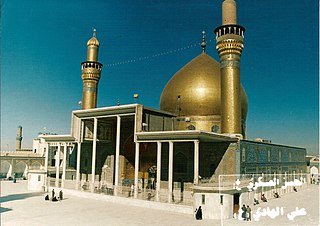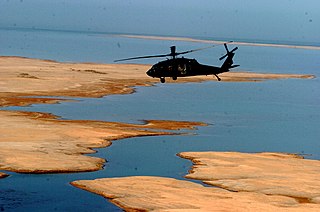Events in the year 2005 in Iraq.

At approximately 6:44 a.m. Arabia Standard Time on 22 February 2006, al-Askari Shrine in Samarra, Iraq, was severely damaged in a bombing attack amidst the then-ongoing Iraq War. Constructed in the 10th century, it is one of the holiest sites in Shia Islam. Despite the magnitude of the explosions, there were no casualties. American president George W. Bush asserted that the bombing had been carried out by Al-Qaeda in Iraq, which denied involvement in the attack.
The following lists events that happened during 2006 in Iraq.
The February 2007 Al-Saydiya market bombing was the detonation of a large truck bomb in a busy market in the Iraqi capital of Baghdad. The suicide attack killed at least 135 people and injured 339 others. The bomb, estimated to be about one ton in weight, brought down at least 10 buildings and coffee shops and obliterated market stalls in a largely Shi‘ite enclave less than a half-mile from the Tigris River.

Events in the year 2008 in Iraq.
The August 2009 Baghdad bombings were three coordinated car bomb attacks and a number of mortar strikes in the Iraqi capital, Baghdad, on 19 August 2009. The explosives were detonated simultaneously across the capital at approximately 10:45 in the morning, killing at least 101 people and wounding at least 565, making it the deadliest attack since the 14 August 2007 Yazidi communities bombings in northern Iraq which killed almost 800 people. The bombings targeted both government and privately-owned buildings.

This article details major terrorist incidents in Iraq in 2008. In 2008, there were 257 suicide bombings in Iraq. On February 1, a pair of bombs detonated at a market in Baghdad, killing 99 people and injuring 200. Two other particularly deadly attacks occurred on March 6, and June 17.

This article details major terrorist incidents in Iraq in 2009. In 2009, there were 257 suicide bombings in Iraq. On April 23, a suicide bombing to a restaurant in Miqdadiyah killed 57 people, while a separate bombing in southeastern Baghdad killed 28. The next day, on April 24, a Shi'a shrine was targeted, in a bombing that killed 60. October and December saw two attacks kill over 100 people, with bombings on October 25 and December 8.
The December 2009 Baghdad bombings were attacks in Baghdad, Iraq, which resulted in the deaths of at least 127 people and injuries to at least 448 more. The attacks have been condemned internationally as acts of terrorism. Opposition parties within Iraqi politics have suggested that the attacks were aided by corruption within the Iraqi security forces and that the Iraqi Prime Minister, Nouri al-Maliki, was incompetent in managing the incident.
Events in the year 2010 in Iraq.
The 10 May 2010 Iraq attacks were a series of bomb and shooting attacks that occurred in Iraq on 10 May 2010, killing over 114 people and injuring 350, the highest death toll for a single day in Iraq in 2010.
The 17 August 2010 Baghdad bombings were two attacks in Baghdad, Iraq. The first attack in the morning was when a suicide bomber detonated his explosives outside the Iraqi Army division headquarters on potential recruits to the army, some of whom had queued for hours prior to the bombings, that killed over 60 and wounded more than 100. The second attack took place in the evening when a fuel truck exploded in a Shia neighbourhood, killing 8 and wounding 44.
Islamic State of Iraq claimed the first of the two attacks.
The 19 September 2010 Baghdad bombings were a series of bomb attacks in Baghdad, Iraq that killed at least 31 people, in two neighbourhoods of the capital. Over a hundred more were wounded. On 24 September the Islamic State of Iraq claimed responsibility for the attack.
On 22 December 2011, a series of coordinated attacks occurred in Baghdad, Iraq, killing 69 people. This was the first major attack following U.S. withdrawal from Iraq.
The 23 July 2012 Iraq attacks were a series of simultaneous, coordinated bombings and shootings that struck the Iraqi security force and Shi'ite Muslim communities. At least 116 people were killed and 299 wounded in the attacks, making them the deadliest attacks in the country since May 2010. The Islamic State of Iraq claimed responsibility for the attacks.

The Islamic State of Iraq was a Salafi jihadist militant organization that fought the forces of the U.S.-led coalition during the Iraqi insurgency. The organization aimed to overthrow the Iraqi federal government and establish an Islamic state governed by Sharia law in Iraq.
In May 2016, the Islamic State conducted a series of bombing attacks in and around Shia neighbourhoods in Baghdad, the capital of Iraq, killing and wounding hundreds. According to ISIL, attacks were aimed at Shia fighters.

The January2021 Baghdad bombings were a pair of terrorist attacks that occurred on 21 January 2021, carried out by two suicide bombers at an open-air market in central Baghdad, Iraq. They killed at least 32 people and injured another 110. This was the Iraqi capital’s first terrorist attack since 2019.
A number of terrorist incidents attacks occurred in 2021 in Iraq.





